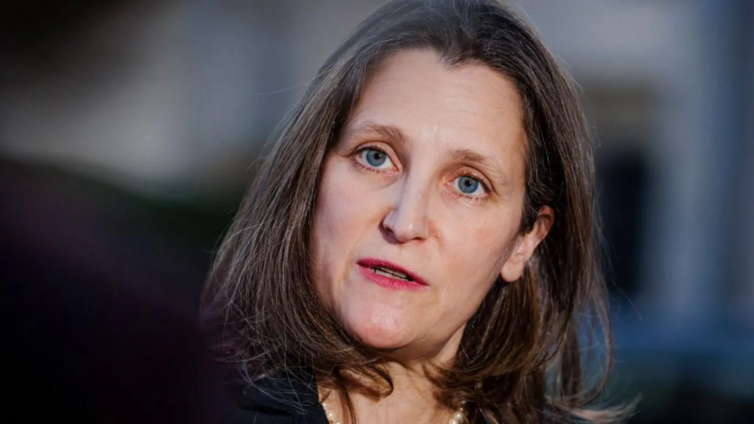
Audio By Carbonatix
Canada's Finance Minister Chrystia Freeland has resigned from her post, citing disagreements with Prime Minister Justin Trudeau on how to respond to incoming President Donald Trump's threat of tariffs.
She announced her resignation in a letter to Trudeau on Monday, in which she said the two have been "at odds about the best path forward for Canada", and pointed to the "grave challenge" posed by Trump's policy of "aggressive economic nationalism".
Freeland said the decision comes after Trudeau informed her last week that he no longer wanted her to be his government's top economic adviser.
Her resignation came hours before she was due to provide an annual fiscal government update in parliament.
In recent days, the two have also reportedly been in a dispute over a policy that would have delivered a C$250 ($175; £139) cheque to every eligible Canadian.
The BBC has reached out to the prime minister's office and the finance department for comment.
In her publicly-shared resignation letter, Freeland said Canada needs to keep its "fiscal powder dry" to deal with the threat of sweeping tariffs from US President-elect Donald Trump.
She added this means "eschewing costly political gimmicks" that Canada cannot afford.
Trump has promised to impose a levy of 25% on imported Canadian goods, which economists have warned would significantly hurt Canada's economy.
Referencing the tariffs, Freeland called them a "threat" that needs to be taken "extremely seriously".
She added that this means "pushing back against 'America First' economic nationalism" and working with unity in response to these tariff threats.
Freeland and Trudeau were reportedly in disagreement over a series of recently-proposed policies by the prime minister designed to address the country's cost-of-living crisis.
Among them is a cheque of C$250 that the government wanted to send to every Canadian earning less than C$150,000 annually. These cheques were expected to cost the federal government a total of C$4.68bn.
Another is a temporary tax break on essential items during the holidays which is anticipated to cost C$1.6bn in lost tax revenue.
Freeland's office had reportedly been concerned about the price of these two policies, saying they are economically unwise at a time when the country's deficit is growing.
The tax holiday has since been approved in the House of Commons, but the C$250-cheques hit a hurdle when the New Democratic Party - a centre-left party in parliament - signalled it would not lend its support to the policy unless it is expanded.
A poll by the Angus Reid Institute showed that four out of five Canadians viewed the cheques as a political move designed to win public goodwill as Trudeau's popularity plummets.
In response to Freeland's exit, Pierre Poilievre, leader of the opposition Conservative Party of Canada, called for a federal election as soon as possible.
"Everything is spiralling out of control. We simply cannot go on like this," he said, adding that her resignation comes "at the very worst time".
Freeland, who also holds the position of deputy prime minister, has long been one of Trudeau's closest allies within his Liberal party. She has held the key role of Canada's finance minister since 2020, helping to lead the country through the pandemic and its aftermath.
She replaced former Finance Minister Bill Morneau, who also resigned from his post amid a dispute with Trudeau over government spending policies, as well as conflict-of-interest allegations he faced involving a youth charity.
Other members of the Liberal party's cabinet have since reacted to her resignation.
"These are difficult and deeply personal decisions and obviously she's made that decision and I respect her for it," said Patty Hajdu, Canada's minister for indigenous relations.
Minister of Transport Anita Anand described Freeland as a "good friend," and added: "This news has hit me really hard and I'll reserve further comment until I have time to process it."
In a statement, the Business Council of Canada called Freeland's resignation "deeply troubling" and said the concerns that she raises put into question "whose interests the federal government is looking out for".
The Department of Finance Canada has indicated that the fall economic statement will be delivered on Monday as planned, despite Freeland's resignation.
Canada's public broadcaster CBC reported that Freeland's decision to quit was not expected today, citing a senior federal government source.
Freeland said she intends to stay on as a Liberal member of parliament, and that she will run again in Canada's upcoming election, which must be held on or before October.
Her resignation comes after another cabinet member, housing minister Sean Fraser, announced he will not be seeking re-election, saying he wants to spend more time with his family.
Latest Stories
-
Ghana is rising again – Mahama declares
5 hours -
Firefighters subdue blaze at Accra’s Tudu, officials warn of busy fire season ahead
5 hours -
New Year’s Luv FM Family Party in the park ends in grand style at Rattray park
5 hours -
Mahama targets digital schools, universal healthcare, and food self-sufficiency in 2026
5 hours -
Ghana’s global image boosted by our world-acclaimed reset agenda – Mahama
6 hours -
Full text: Mahama’s New Year message to the nation
6 hours -
The foundation is laid; now we accelerate and expand in 2026 – Mahama
6 hours -
There is no NPP, CPP nor NDC Ghana, only one Ghana – Mahama
6 hours -
Eduwatch praises education financing gains but warns delays, teacher gaps could derail reforms
6 hours -
Kusaal Wikimedians take local language online in 14-day digital campaign
7 hours -
Stop interfering in each other’s roles – Bole-Bamboi MP appeals to traditional rulers for peace
7 hours -
Playback: President Mahama addresses the nation in New Year message
8 hours -
Industrial and Commercial Workers’ Union call for strong work ethics, economic participation in 2026 new year message
10 hours -
Crossover Joy: Churches in Ghana welcome 2026 with fire and faith
10 hours -
Traffic chaos on Accra–Kumasi Highway leaves hundreds stranded as diversions gridlock
10 hours

